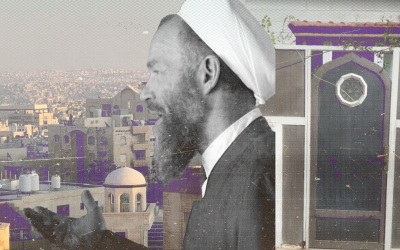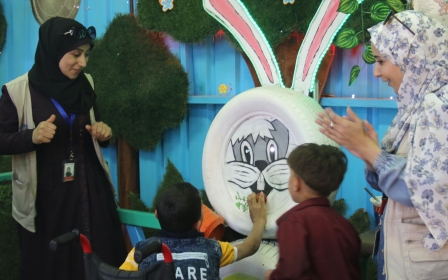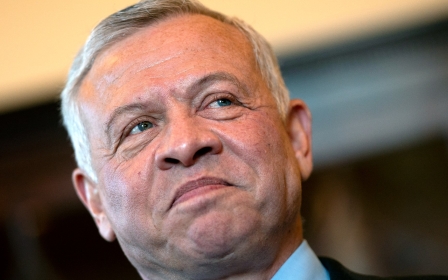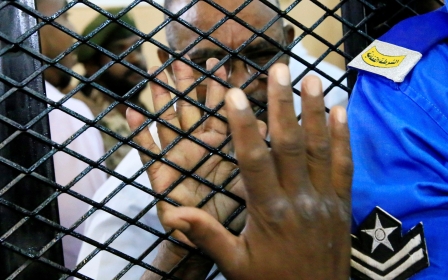Jordan's 'other' refugees stuck in limbo with frozen asylum claims
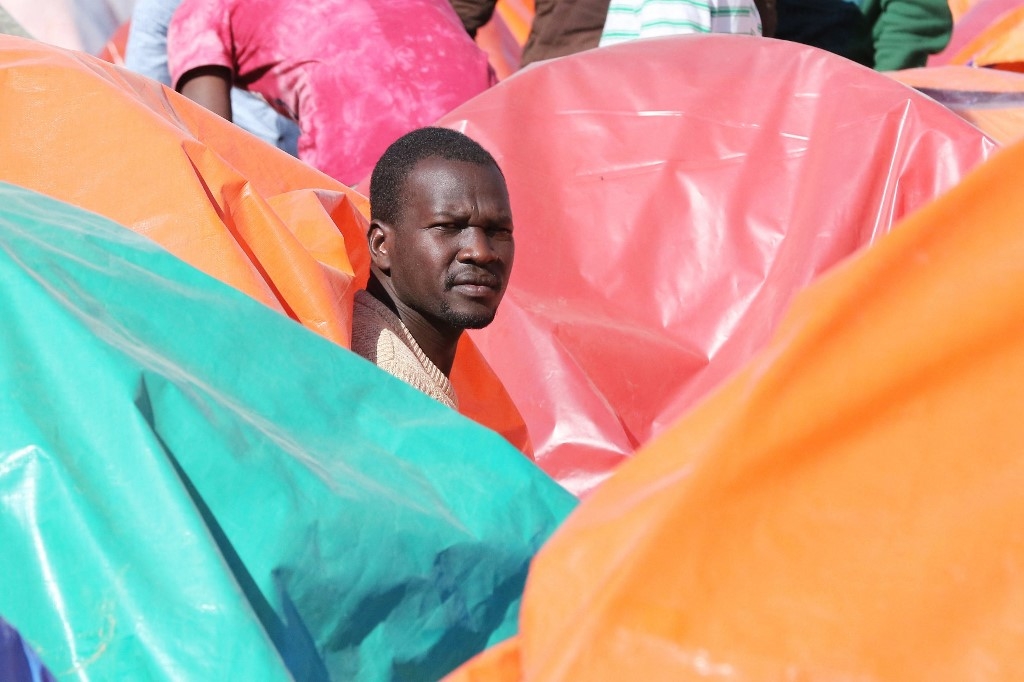
Before he fled Sudan, Ahmed was an award-winning runner. Now, as an undocumented asylum seeker in Jordan, he mostly runs away from the police.
"But I'm not a criminal," he says as he opens his backpack to show his seven medals - gold, silver and bronze - won at junior championships in three different countries. His only crime, he says, was to travel on a medical treatment visa to Jordan, where he hoped to apply for asylum.
'I ran away from injustice, from war and from discrimination, but I'm treated like a criminal here just because I want to live in a safe place'
- Ahmed, Sudanese refugee
Since January 2019, Jordanian authorities have prevented the United Nations' refugee agency (UNHCR) from registering as asylum seekers anyone who enters the country for the purposes of medical treatment, tourism, study or work - effectively barring non-Syrians from being recognised as refugees.
"The medical treatment visa was my only way of leaving Sudan," says Ahmed, who fled the Blue Nile region in 2019 when he turned 18 and now lives in an apartment with other Sudanese men in a suburb of Amman, Jordan's capital.
"I ran away from injustice, from war and from discrimination, but I'm treated like a criminal here just because I want to live in a safe place," he tells Middle East Eye.
New MEE newsletter: Jerusalem Dispatch
Sign up to get the latest insights and analysis on Israel-Palestine, alongside Turkey Unpacked and other MEE newsletters
The Jordanian cabinet's decision to freeze UNHCR registrations has left thousands like Ahmed without documentation or access to humanitarian aid and basic services. Undocumented and considered to be in the country illegally, many are at risk of deportation.
For Ahmed, who arrived in Amman just a few months after UNHCR stopped registering asylum claims, the decision has meant living in fear of being detained and deported for being undocumented.
"Where am I supposed to go? It's not safe for me in Sudan, my brother was shot dead," he says. "But I can't stay here with my life suspended, without any rights or protection."
Refugees: 'A burden'
While the Jordanian government's decision does not specify which nationalities are prevented from applying for asylum, it mostly affects people from Yemen, Sudan and Somalia, who need visas to be able to fly to Jordan, since they are unable to cross borders by land like Syrians.
"We are aware of 5,500 non-Syrians who wanted to register with UNHCR but were unable to since 2019," UNHCR spokesperson Lilly Carlisle told MEE, adding that, without registration, asylum seekers are unable to receive formal aid, access medical care or enrol in schools.
"Not everyone who comes from Sudan, Yemen or Iraq is necessarily a refugee, but we need to be able to assess their claims as per international refugee law in order to protect people who might be in a very vulnerable position."
The Jordanian government did not reply to MEE's interview requests in time for publication. In an interview with Al Jazeera Arabic last year, Jordan's interior minister, Mazin al-Farrayeh, defended the government's decision to close off asylum claims, arguing that Jordan is no longer able to bear the burden of hosting a large number of refugees.
"Taking advantage of the permission the government gave for those coming to seek medical treatment to apply for asylum poses a big burden on the kingdom," the minister told Al Jazeera, adding that Jordan "is not supposed to or required to bear that burden".
Home to more than a million refugees, Jordan is host to among the largest number of displaced people in the world relative to its own population. But the country is not a signatory to the 1951 Refugee Convention, which prohibits discrimination as to country of origin and states asylum seekers cannot be forced back to a country if they face persecution there.
Last March, Jordanian authorities waived visa requirements for Ukrainians with relatives in the kingdom and gave them temporary residency on humanitarian grounds. Asylum seekers from other countries, however, are still unable to apply for residency and protection.
'Our life is suspended'
Umm Mohammad fled Sanaa and six years of war with her four children last year.
"We lived through war in Yemen, and I didn't want my girls to be married off too young and my son to be enlisted in the army," she says.
But when she arrived in Jordan, one of the few countries still open to Yemenis, she was shocked to find that her family was unable to register with UNHCR.
"If UNHCR is not able to protect us, who will?" she asked MEE.
"I just wanted a better future for my children. But we live in fear here, without papers we are always afraid of being detained and deported, and it's very dangerous for us back in Yemen.
"The children can't go to school, we can't work legally, we can't do anything. It's as if our life stopped, as if it's suspended."
According to Human Rights Watch, Jordanian authorities have deported Yemeni, Sudanese and Syrian asylum seekers in violation of the international principle of non-refoulement, which prohibits countries from returning people to a country where they may face persecution or serious harm.
The group said Jordan's actions are leaving many vulnerable people facing forced return and exposed to danger in their countries of origin.
Dina Baslan, a researcher and refugee rights advocate, says that by freezing UNHCR registration the Jordanian government "is sending a clear message that these refugees are not welcome, and that the country doesn't have the capacity to host more people".
"This doesn't only frame them as illegal in the country, but also facilitates harassment, exploitation and racism against them."
Baslan is the co-founder of Sawiyan, a non-profit organisation providing support to marginalised refugees in Jordan. Sawiyan's work began in December 2015, when hundreds of registered Sudanese refugees were deported for protesting against discrimination and deteriorating living conditions.
Even before the government froze asylum registrations for non-Syrians, Baslan says refugees from countries like Sudan, Yemen, Iraq and Somalia did not have the same access to basic health, education and services, as most of the funding is directed to Syrians and vulnerable Jordanians, and UNHCR's appeals for support are chronically underfunded.
The inability to register, however, has made an already difficult situation increasingly dire.
"We are talking about thousands of unregistered people who can't stay in Jordan and can't be sent back home," says Baslan. "We need to secure resettlement opportunities for those whose lives depend on it."
Ahmed, who fled Sudan as a teenager, has spent the last three years of his life waiting for a solution.
"I wanted to study, to work, to contribute to society, to help other people. But I can't do anything here," he says, admitting that he has started to lose hope and that he has seen many like him break down.
He takes out a school diploma from the backpack he had filled with medals he won as a sprinter.
"I was a good student, I could have graduated from university by now. But instead I'm just wasting my life here," Ahmed says.
'Sharing the little we have'
To be able to survive, many undocumented asylum seekers are forced to find work in the informal sector, often in construction or agriculture.
"The boss knows we are undocumented, so he often takes advantage of us," says Ahmed, who has been exploited by employers while working informally in construction.
'Registered refugees are sharing their meals with the non-registered, hosting them in their homes'
- Dina Baslan, researcher
"Sometimes they pay us only a portion of the salary, or don't pay us at all. There is nothing we can do about it because if we go to the police, we will be the ones getting arrested and maybe even deported because we're undocumented. There is no one to protect us, it's as if we don't exist."
Umm Mohammad has had to rely on friends who help her pay rent and a few non-profit organisations distributing food coupons and informal aid. But she says her situation is becoming increasingly difficult to bear.
"Registered refugees are sharing their meals with the non-registered, hosting them in their homes," says Baslan.
"But they were already struggling to make ends meet before this added burden. Should the duty of caring for the non-registered fall on already vulnerable individuals?" she asks.
For Ahmed, the support and generosity of the Sudanese community in Jordan has been a lifeline.
"We help each other," he says. "We share the little we have with each other. That's the only thing keeping me alive here."
Ahmed and Umm Mohammed declined to give their full names in order to protect their identity.
Middle East Eye delivers independent and unrivalled coverage and analysis of the Middle East, North Africa and beyond. To learn more about republishing this content and the associated fees, please fill out this form. More about MEE can be found here.


